
Seeding Success
New technology helps farmers at planting
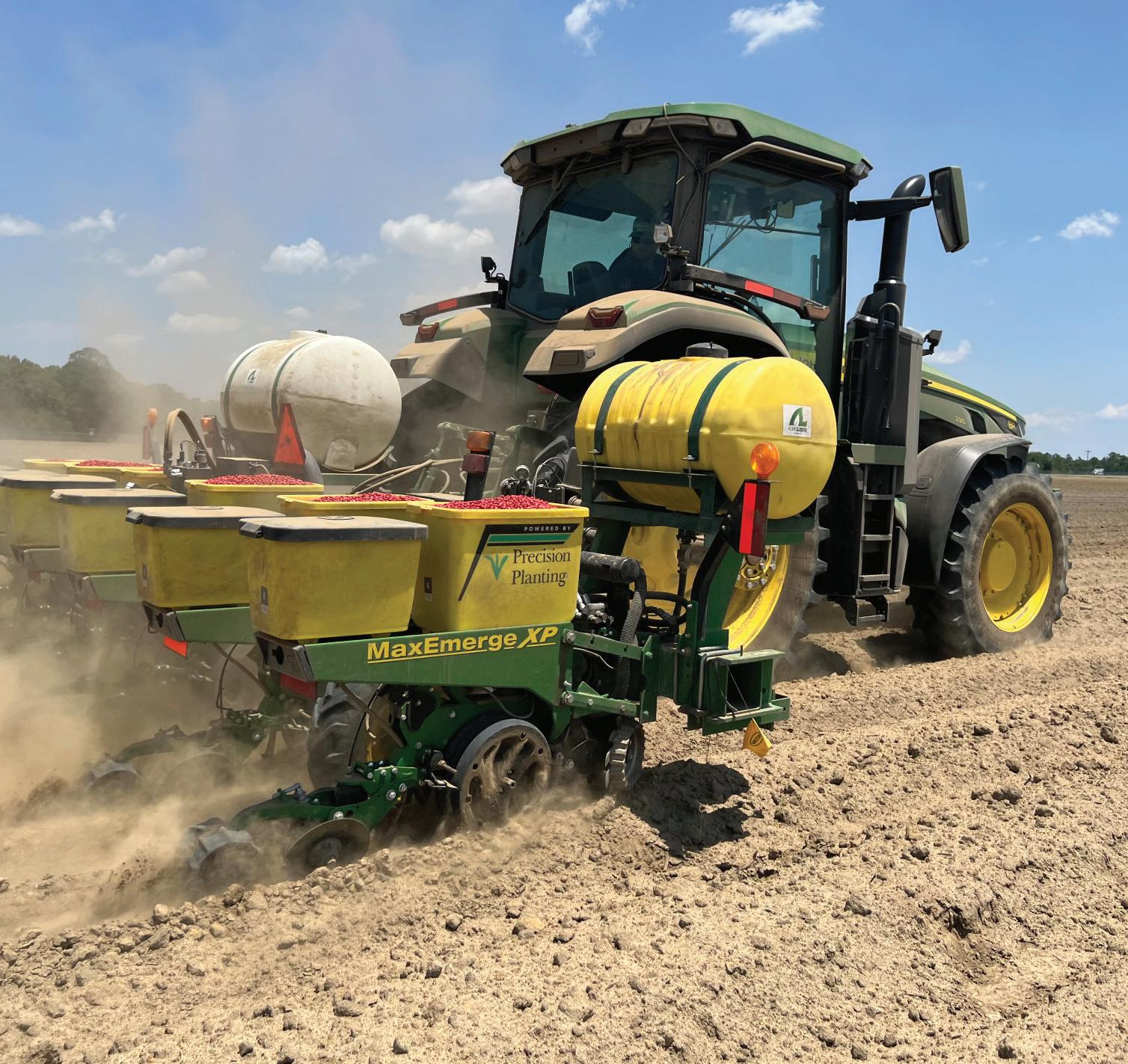
Vol. 62 No. 2 | March 2024 2024
Weed Guidebook
Peanut

6 | SEEDING SUCCESS
New technology provides farmers with metrics on each row unit across the planter in real-time during planting.
16 | WIREGRASS RESEARCH
HudsonAlpha Wiregrass help students in Dothan, Alabama, gain real-life research experience and the power of genomics through a peanut project.
18 | GA PEANUT FARM SHOW
A review of the 47th annual Georgia Peanut Farm Show and Conference.
20 | PEANUT LEADERSHIP ACADEMY CLASS XIII
The Peanut Leadership Academy kicked off the first session for Class XIII in Savannah, Georgia.
DEPARTMENTS
8 | CHECKOFF REPORT
Alabama Peanut Producers Association
Florida Peanut Producers Association
Georgia Peanut Commission
Mississippi Peanut Growers Association
24 | WASHINGTON OUTLOOK
26 | SOUTHERN PEANUT GROWERS UPDATE


2024 PEANUT WEED GUIDEBOOK
The Peanut Weed Guidebook provides management tips for 2024, tips for minimizing mistakes with herbicides, an outlook on limited new herbicide products for peanuts and updates on Classic and Dicamba.
New planting technology provides farmers with metrics on each row unit across the planter in real-time during planting.
Photo credit: Simer Virk, University of Georgia.

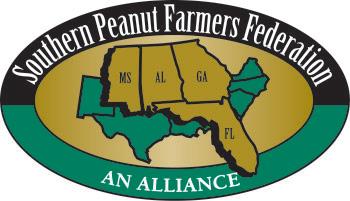
March 2024 | Southeastern Peanut Farmer 3 A Look Inside March 2024 | Peanut Weed Guidebook Southeastern Peanut Farmer is published six times a year (Jan./Feb., March, April, May/June, July/Aug., and Oct./Nov.) by the Southern Peanut Farmers Federation. The publisher is not responsible for copy omission, typographical errors, or any unintentional errors that may occur, other than to correct it in the following issue. Any erroneous reflection which may occur in the columns of Southeastern Peanut Farmer will be corrected upon brought to the attention of the editor. (Phone 229-386-3690.) Postmaster: Send address changes (Form 3579) to Southeastern Peanut Farmer, P.O. Box 706, Tifton, Georgia, 31793. Circulation is free to qualified peanut growers and others allied to the industry. Periodical postage paid at Tifton, Georgia and additional mailing office. Editorial Content: Editorial copy from sources outside of the Southern Peanut Farmers Federation is sometimes presented for the information and interest of our members. Such material may, or may not, coincide with official Southern Peanut Farmers Federation policies. Publication of material does not necessarily imply its endorsement by the Southern Peanut Farmers Federation. For editorial concerns call 229-386-3690. No portion of this or past issues of the Southeastern Peanut Farmer may be reproduced in any form whatsoever without the written consent of the editor. By-lined articles appearing in this publication represent views of the authors and not necessarily those of the publisher. Advertising: The Publisher reserves the right to refuse any advertisement. Corrections to advertisements must be made after the first run. All billing offers subject to credit review. Advertisements contained in this publication do not represent an endorsement by the Southeastern Peanut Farmer or the Southern Peanut Farmers Federation. Use of trade names in this publication is for the purpose of providing specific information and is not a guarantee nor warranty of products named. For advertising concerns call 229-386-3472. SEPF TEAM Editor Joy Carter Crosby joycrosby@gapeanuts.com 229.386.3690 Director of Advertising Jessie Bland jessie@gapeanuts.com 229.386.3472 Contributing Writing Kaycee Rippey kaycee@alpeanuts.com 334.792.6482 12
IN THIS
ISSUE
On The Cover
Editor’s thoughts Events
No Farmers, No Food
The month when the peanut industry and agriculture celebrations intersect is finally here! I don't know about you, but I'm ready to celebrate March as National Peanut Month and National Ag Day on March 19.
Recently on social media I've seen some of my friends sharing a yellow graphic with a tractor on it that simply says, "No Farmers, No Food." The campaign was launched by a Fife farmer in Scotland and has attracted more than 60,000 followers on X (formerly Twitter) in less than a month. The campaign touts their campaign themes focusing on mental health, environmental agency cuts and flooding, unfair supermarket pricing, unregulated imported food and more. Even though they are across the pond, farmers in the United States are struggling with some of the same issues.
There have been similar campaigns focusing on farmers in the U.S. through the years - some have gained traction while others lasted for a while and then lost momentum. We have an opportunity to make an impact again, not only in March for National Peanut Month or on National Ag Day, but each day of the year. Through cooperation and marketing, we can make an impact by influencing those we communicate with daily.
Here are a few quick facts from the National Ag Day website you can use as you communicate with those around you or post on social media.
• Farming and related industries employ 21.6 million people making up 11 percent of total U.S. employment.
• Small family farms account for 90 percent of all U.S. farms.
• Farmers are proud stewards of our land, water and air.
I know sometimes it feels like we are speaking to the choir or maybe wasting our breath, but I can assure you, we are farther along by speaking out than sitting quietly by and not being a spokesperson for our industry. So, I encourage you to take the time to stand up and be proud of the industry you are involved in.

REFERENDUM NOTICE


March 8 - April 8, 2024
Ballots are mailed to farmers. If you do not receive a ballot then contact the Georgia Peanut Commission at 229-386-3470.
April 8 - 19, 2024
Ballots are mailed to farmers. Instructions will include information about electronic balloting options.
Peanut Proud Festival
March 23, 2024, Blakely, Ga. For more info visit www.peanutproudfestival.com.
USA Peanut Congress
June 10-13, 2024, Amelia Island, Fla. For more information call 229-888-2508 or visit peanut-shellers.org.
American Peanut Research and Education Society Annual Meeting
July 9-11, 2024, Oklahoma City, Okla. For more information visit apresinc.com.
Southern Peanut Growers Conference
July 17-19, 2024, Westin Savannah Harbor Golf Resort & Spa, Savannah, Ga. For more information visit the conference website at southernpeanutfarmers.org.
Sunbelt Ag Expo Field Day
July 18, 2024, Moultrie, Ga. For more information call 229-985-1968 or visit the Expo's website at sunbeltexpo.com.
American Peanut Shellers Association and National Peanut Buying Points Association Pre-Harvest Meeting
Aug. 20-21, 2024, Albany, Ga. For more information call 229-888-2508 or visit peanut-shellers.org.
Brooklet Peanut Festival
Sept. 21, 2024, Brooklet, Ga. For more information visit the festival's website at brookletpeanutfestival.com.
Plains Peanut Festival
Sept. 28, 2024, Plains, Ga. For more information call visit the festival's website at jimmycarterfriends.org.
Georgia National Fair
Oct. 3-13, 2024, Perry, Ga. For more info visit georgianationalfair.com.
Sunbelt Ag Expo
Oct. 15-17, 2024, Moultrie, Ga. For more info call 229-985-1968 or visit the Expo's website at sunbeltexpo.com.
Let us know about your event. Please send details to the editor at joycrosby@gapeanuts.com.
Southeastern Peanut Farmer | March 2024 4
Joy Carter Crosby SEPF Editor
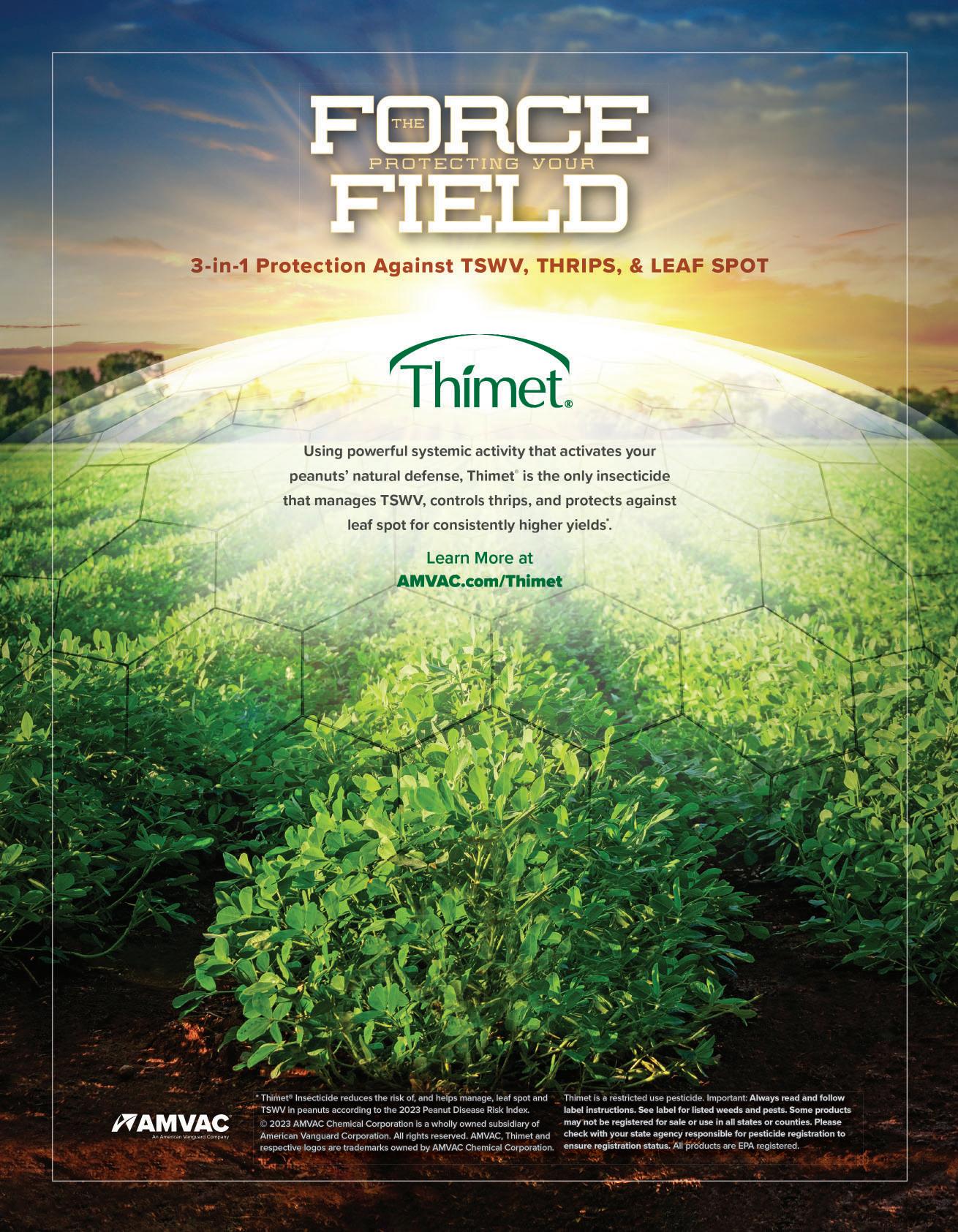
Seeding Success
New Technology Helps Farmers at Planting
by Joy Crosby

Planting technology continues to evolve and change. In fact, many of the advanced technology components available for farmers today didn't exist five to 10 years ago. In the past, farmers would only know the seed population they planted. However, today's planter can provide data ranging from how well the seed meters are performing, seed singulation, downforce and many other similar performance metrics on each row unit across the planter in real-time during planting.
"We even have some sensors today on the planters that can provide information on soil moisture and temperature in the furrow, as well as seed spacing quality and downforce being applied on each row-unit," says Simer Virk, University of Georgia precision ag specialist.
According to Virk, a lot of the technology for planters in the past has been geared towards corn and soybean with cotton being the next crop to benefit from this technology. However, he is seeing a shift as farmers realize the value in the new
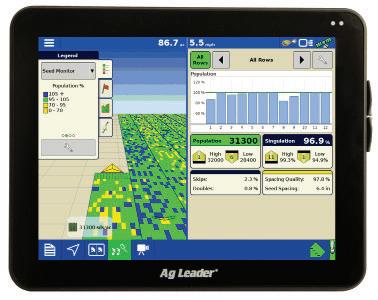
technology available with peanut planters.
The University of Georgia Extension budgets have peanut seed costing approximately .90 cents per pound. So, with high seed costs and the emphasis on precisely putting that seed in the furrow, farmers need to make sure their planter is performing well with correct seeding rate and seed placement being achieved during planting.
"We usually have issues with overseeding when planting peanuts. If a farmer doesn't know how much seed they are putting out in the furrow and are putting more than what’s needed, then I think we are wasting money that could actually stay in their pockets," Virk says. "We're trying to maximize the yield of peanuts at a nominal seeding rate instead of putting too much seed in the furrow."
To help address this issue, Virk recommends using a high-quality seed monitor where a farmer can see both population and singulation for each row while planting. In older style planters, a farmer could only see the
planted population averaged across the whole planter so they would not be aware of any issues occurring on any specific row units. That’s why having a good quality seed monitor that can provide by-row feedback is important to ensure each row-unit is performing at the highest level.
Seed Singulation
In addition to seed population, the singulation of peanut seed is important too. One of the main reasons farmers have not used singulation before with peanuts is the high seeding rate.
Singulation is basically how well the seed meter is performing in terms of metering seed. If there are no skips or multiples, then the seed meter is working perfectly and has 100 percent singulation. However, some skips and multiples are common during planting and therefore each row-unit needs to be checked if its metering seed correctly or not.
It is important for farmers to set up their seed meters properly considering the seeding rate, field conditions
Southeastern Peanut Farmer | March 2024 6
Today's planter can provide data ranging from how well the seed meters are performing, seed singulation, downforce and many other similar performance metrics on each row unit across the planter in real-time during planting.

and ground speed used for planting peanuts.
"We have technology today to make sure that we are getting more than 90 percent singulation even in peanuts, which is pretty good but again a lot of our growers today are not capitalizing on these technologies," Virk says.
In the past, peanut planting may have been taken for granted due to higher seeding rates, Virk says, when compared to other crops like corn and cotton where the penalty is generally higher for skips or multiples during planting. However, as peanut seed costs increase farmers can utilize some of the planting technologies available today to improve seed singulation and use it as one way to manage their seed costs.
There are different options available to improve seed singulation. If a farmer has a standard seed meter, then they can install some small components like a singulator, also known as a doubles eliminator. These small components will knock out an extra seed that gets picked up to make sure everything is being precisely measured and makes the seed meter less sensitive to higher vacuum pressure.
According to Virk, if a farmer plants just one extra seed because of a planter mistake, that is roughly 14,000 extra seeds per acre being planted. When the 14,000 extra seeds are multiplied by the number of acres
planted, a farmer can see the rising costs and the importance of proper seed metering and singulation.
"There is also some variability between the row units on a planter, but newer technologies also provide an opportunity to monitor this variability in real-time and correct or adjust settings accordingly to maximize seed placement efficiency and save money," Virk says.
The three common seed meters used by growers for planting peanuts include John Deere, Monosem and Precision Planting. Each of the seed meters have different metering components, especially seed disk design, and varies in performance as well.
Planter Downforce
The target seeding depth for peanuts is two to two and a half inches. It is important for farmers to check multiple areas within the field and also each row unit on the planter to make sure the seeding depth is correctly attained across the whole planter.
There are two items that control the seeding depth - planter depth setting and downforce. Soil texture or type variability within a field can result in peanuts being planted shallower in some areas and deeper than target seeding depth in some areas.
"Downforce is extra weight on each row unit (besides its own weight) that the farmer can adjust to attain
a desired seeding depth," Virk says. "There is technology available today for growers to utilize such as active downforce which utilize hydraulic cylinders that can adjust downforce based on the soil type and field conditions."
There are also mechanical downforce upgrade options for farmers who may not want to invest in active downforce technology; however, their benefits are limited as they do not actively change downforce as field conditions change during planting.
"The key is making sure you have enough downforce because the penalty is higher in peanuts when seed is placed shallower than the target seeding depth," Virk says. "Don't be afraid to go a little heavy on downforce in peanuts if needed because it does not affect peanut seed as much as it affects corn and cotton due to difference in seed size."
Technology Cost
According to Virk, the most imporant step for farmers is to have a good quality seed monitor.
"Make sure you have a highquality seed monitor that can tell you what's going on across the whole planter so you can avoid costly mistakes," Virk says. "It is critical to find the issues as they are occurring during planting instead of finding out about those after the peanuts have emerged."
According to Virk, there can be a lot of variability across the planter rowunits in a field which could also be due to the different soil types within a field. The costs of a good seed monitor can range from $5,000 to $10,000 depending on the technology or equipment manufacturer. However, if a farmer already has an existing monitor in their tractor, some upgrades to enable seed monitoring on existing planters can be made for under $5,000.
"If a farmer will put the pencil to how much money the extra seed is costing them without the technology, then they can realize quickly that they should be able to pay for a seed monitor," Virk says.
March 2024 | Southeastern Peanut Farmer 7
Planted Population #seeds/ft Seeds per Acre @36 in@38 in 687,12082,535 572,60068,779 458,08055,023 3 43,56041,267 229,04027,512 114,52013,756
Seed singulation is basically how well the seed meter is performing in terms of metering seed. Skips or multiples are common during planting. One extra seed picked up by the planter can result in approximately 14,000 extra seeds per acre, which equals higher seed costs.
Checkoff Report
Investments Made by Growers for the Future of the Peanut Industry
FPPA supports University FFA AgBags

The Florida Peanut Producers helped the University FFA group in a community service program to feed the homeless. University FFA put 240 bags together, and 120 went to the local school food pantry to use for the hungry or homeless student population. The other 120 were distributed through Straight Street, an organization that feeds the homeless population in downtown Orlando. The kids wanted to include the peanut butter because it is packed with protein, can be stored easily for those without homes and lasts multiple meals. They also added water bottles, chips, and granola bars to the bags. FPPA was glad to be able to help provide peanut butter to those in need.
FPPA exhibits at Florida State Fair in Tampa


The Florida State Fair in Tampa was held from Feb. 8 - 19, 2024. The Florida Peanut Producers held an exhibit in the Ag Hall of Fame. The Florida Agricultural Hall of Fame building honors men and women who have made lasting contributions to agriculture in this state and to mentoring our youth, representing the future of agriculture in Florida. During the two weeks, FPPA spent time at the booth visiting with fairgoers and handing out peanut literature, roasted peanuts, and other educational materials. The University of Florida IFAS Research and Education Center in Greenwood, Florida, grew peanut plants to use as a visual aid at the booth. The Florida Peanut Producers sponsored the Ag Hall of Fame Holographic Performance. It's an experience to travel back in time and into the future of farming with hologram theater featuring Florida commodities.
APPA hosts peanut grower production meetings
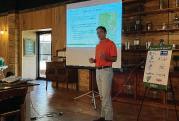
The Alabama Peanut Producers Association hosted eight peanut grower production meetings across the state during February 2024. More than 200 growers came out to hear Alabama peanut researchers from Auburn University and Alabama Cooperative Extension share their latest research and best practices for the 2024 growing season.
Topics and speakers were: Peanut Disease Management – Dr. Amanda Strayer-Scherer; Herbicide Control in Peanuts – Dr. Steve Li; Insect Control in Peanuts – Dr. Scott Graham; Peanut Market Outlook – Dr. Marshall Lamb; Varieties and Agronomic Management – Kris Balkcom.
Sponsors for the production guide and production meetings were: Alabama Ag Credit, BASF, Corteva, First South Farm Credit, Sanbuck Insurance, Syngenta, Southern Ag Services, United Bank, Valent, Visjon Biologics.
APPA attends Alabama School Nutrition Industry Show

The Alabama Peanut Producers Association was a bronze sponsor and exhibitor at the Alabama School Nutrition Association Industry Show on Feb. 16, 2024, in Birmingham, Alabama. Kaye Lynn Hataway, APPA promotions coordinator, visited with school nutrition directors, managers and cafeteria workers during the ASNA industry show where approximately 600 ASNA members were in attendance.
Visitors to the APPA booth received information about managing peanut and other allergens in schools, as well as the new "Peanut Power for Schools" – a guide to serving peanuts in school foodservice. There were also peanuts, peanut butter spreaders and recipes for attendees.
Planters NutMobile visits Dothan
The Alabama Peanut Producers and Planters joined forces for a great cause on Jan. 6, 2024. APPA and Visit Dothan hosted a Peanut Butter Drive to benefit the Wiregrass Area Food Bank. Mr. Peanut and the Planters Peanutters also made an appearance in their famous NutMobile, drawing quite a crowd. Over 300 lbs of peanut butter were donated to help bring the comfort of peanuts to the Wiregrass.

Southeastern Peanut Farmer | March 2024 8
University FFA Chapter delivers snack bags packed with peanut butter and other nutritious foods to Straight Street. FPPA donated the peanut butter for the bags.
Brittany Peacock with FPPA mans the exhibit during the Florida State Fair in Tampa.
Kaye Lynn Hataway, APPA promotions coordinator, hands Tammy Scott, a manager from Slocomb, Ala., and a peanut farmer, a reusable sandwich bag for stopping by the booth.
Max Cavassa, a PhD student at Auburn University studying under Amanda Strayer-Scherer, gives peanut disease management recommendations at a peanut production meeting in Hartford, Ala.
FPPA participates in the ribbon cutting for the Ag Hall of Fame holographic theater.


Boddiford elected chairman of Georgia Peanut Commission


Joe Boddiford, peanut farmer from Sylvania, Georgia, was elected chairman of the Georgia Peanut Commission during the January monthly board meeting. This is Boddiford’s third consecutive term serving as chairman. He previously served as chairman in 2000.
"I look forward to working with Georgia peanut farmers and our industry partners to help enhance the peanut industry and the profitability of farmers," Boddiford says. "Farmers can contact me at any time if they have suggestions for the work of the Georgia Peanut Commission on their behalf."
Other officers elected during the board meeting include Donald Chase, Oglethorpe, Georgia, as vice chairman, and Rodney Dawson, Hawkinsville, Georgia, as treasurer. Additional board members include Tim Burch, Newton, Georgia, representing district 1 and Ross Kendrick, Sycamore, Georgia, representing district 2.
Georgia Peanut Commission exhibits at American Farm Bureau annual meeting

The Georgia Peanut Commission exhibited at the Georgia Farm Bureau annual convention held in December and the American Farm Bureau Convention held in January. The events provided GPC an opportunity to visit with farmers from across the state and nation. The GPC provided educational information and roasted peanuts. Additionally, in January, GPC exhibited at the Georgia Young Farmer state convention at Jekyll Island, Georgia.
APPA elects new board member and officers

Ashley Kelley, a third-generation farmer from Andalusia, Alabama, was elected to the Alabama Peanut Producers Association Board of Directors at the APPA Annual Meeting Feb. 1, 2024. Kelley grew up on his family's farm, but parted ways with it for a while as a young adult trying to find the right career path. Eventually, farming found its way back into his life. In 2009, he got back into the family business, tending around 600 acres of row crops. Now, Kelley and his two sons, Mason and Landon, farm over 3,500 acres across Covington and Conecuh County.
He is replacing Glen Walters, who stepped down in 2024. Walters has been a wealth of knowledge to Kelley since getting back into farming and his greatest piece of advice was to get more involved so that he could have a say in the improvement of the peanut industry.
The APPA Board of Directors elected officers for 2024 which include Carl Sanders as president, Mark Kaiser as vice president and Jerry Byrd as treasurer.

Georgia Peanut Commission holds Research Report Day
The Georgia Peanut Commission held its annual Research Report Day, Feb. 7, 2024, in Tifton, Georgia. The event provides growers and industry representatives an opportunity to hear the latest reports and newest information available on peanut research projects funded by GPC in 2023.
"The commission works to wisely invest peanut farmers' dollars into research projects across Georgia in an effort to reduce production input costs and improve agronomic techniques," says Donald Chase, GPC Research Committee chairman. "Although some of the findings are preliminary, the projects are exciting, and many times new recommendations or observations are announced."

GPC awarded $706,139 to peanut research facilities in the state during 2023. This effort funds 35 research projects from the University of Georgia, Abraham Baldwin Agricultural College and the USDA Agricultural Research Service. The research programs primarily focus on peanut breeding, conservation methods, irrigation and water management, as well as pests, weed and disease management.
The 2023 research reports are available online at the GPC website, www.gapeanuts.com.
March 2024 | Southeastern Peanut Farmer 9
Reports by
Simer Virk, University of Georgia precision agriculture specialist, provides an update on spray parameters and technologies on canopy coverage and efficacy of fungicide applications during the annual Research Report Day, Feb. 7, 2024.
Joe Boddiford, Sylvania, Ga., was elected chairman of the Georgia Peanut Commission.
Ashley Kelley, Andalusia, Ala., was elected to the Alabama Peanut Producers Association board of directors.
Georgia Peanut Commission staff and board members pass out peanuts to American Farm Bureau members during the convention.

2024 Peanut WEED Guidebook peanut weed management for 2024
By Joy Crosby
As farmers begin to plan for their 2024 peanut crop, weed management should be at the forefront of their plans.
A clean, weed-free field at planting is one of the first recommendations offered by University of Georgia Extension weed specialist Eric Prostko, during weed management meetings this winter through the Extension service. Throughout the season, Prostko encourages growers to be timely with their various applications for weed control.
One solid program Prostko recommends for preplant burndown is to use Roundup or Gramoxone plus 2,4-D amine, plus Valor (2 oz/A). According to Prostko, a grower can still add an additional 2 ounces of Valor at planting. He recommends the Valor for preplant burndown so that weeds, especially Palmer amaranth, do not emerge between the time a grower sprays their burndown and when they return to the field for
planting.
Through the years, Prostko has done numerous studies comparing the use of Sonalan or Prowl program. He hasn’t seen a difference in their control, so he encourages growers to use what they prefer. However, if a grower is in a strip-till situation then Prostko recommends Prowl over Sonalan.
Prostko cautions farmers against what he refers to as revenge spraying. If a farmer has two-foot-tall pigweed, there is very little a farmer can do to manage the pigweed. Therefore, it is not worth it for a farmer to just spray a lot of chemicals to try to control the weed at that point.
"Timing is critical," Prostko says. "In some cases, very little can be done once a farmer lets the weeds get out of hand."
For farmers needing residual control of both pigweed and a variety of grasses, Prostko recommends Prowl or Sonalan, Valor and Strongarm. He
then adds an over-the-top application of Cadre, Dual Magnum and 2,4DB. The Dual Magnum could also be replaced with Warrant, Valor, Zidua or Anthem Flex. These Group 15 herbicide (Anthem Flex, Dual Magnum, Outlook, Warrant or Zidua) will provide extended residual control of Palmer amaranth, annual grasses and tropical spiderwort.
In some cases, growers may struggle with which herbicides to tank-mix together and Prostko recommends an app, Mix-Tank. The app is free and allows farmers to choose the products they are planning to spray and then the app lists the sequence that farmers need to add the chemicals to the tank.
Lastly, Prostko receives numerous calls where a certain herbicide didn’t work and the farmer asks if there are resistance issues.
"Of course, resistance can happen," Prostko says. "However, I need to know how the herbicide was
Southeastern Peanut Farmer | March 2024 10
applied to rule out other issues, first."
When trying to figure out why a herbicide didn't work, Prostko questions the size of the weeds, how the herbicide was applied and at what rate, calibration, tank-mixes used and the environmental conditions at spraying, to determine the cause of the issue.
In some cases, farmers are not applying the most effective rate Prostko says. As an example, the herbicide Outlook comes in a gallon jug which is 128 ounces. It is easy for a farmer to use one jug for 10 acres. However, Prostko says 12.8 ounces isn’t the rate he recommends. He encourages farmers to use 14 or 16 ounces to get the best residual control.
"Sometimes farmers use lower rates because it is convenient," Prostko says. "However, they may not get the same level of control."
Coverage is another issue Prostko notices especially when reviewing fields with issues. He recommends a boom height 20 to 24 inches above the target (when practical), as well as proper nozzle selection based on what the farmer is spraying. He also encourages farmers to slow down their tractor speed to somewhere less than 18 mph to obtain consistent and uniform coverage across the field.
In recent years, Prostko has seen damage to peanut fields from pine tree herbicides. He has done numerous research studies through the years on various products not labeled for peanuts to see how much damage is too much and when a farmer needs to keep or not keep the crop based on the misapplication or drift. If a farmer thinks there is an issue with drift, then Prostko encourages them to contact their local Extension agent.
One final tip at the end of the season is to prevent seed rain into the fields by hand-pulling those weeds prior to harvest. Prostko reminds farmers that one female Palmer amaranth plant can produce more than 500,000 seeds!
Classic Herbicide UPdate
Research and field observations in Georgia have confirmed the use of Classic (chlorimuron) in peanut production can occasionally result in an increased expression of tomato spotted wilt virus. University of Georgia Extension weed specialist Eric Prostko has been studying the use of Classic to control Florida beggarweed for a number of years.
The effects of Classic on TSWV have been documented in 36 UGA field trials. In these trials, Classic caused a less than 10 percent increase in TSWV approximately 87 percent of the time and greater than 10 percent increase in TSWV approximately 13 percent of the time. These results suggest that the effects of Classic on TSWV are minimal in comparison to the other production practices that influence this disease. Late-season Florida beggarweed populations that have the potential to reduce harvest efficiency and/or fungicide spray deposition should be treated with Classic.
Late-season Florida beggarweed plants can also be controlled using
Gramoxone (paraquat) in a nonselective applicator such as a wiper, sponge, wick-bar or with mowing. Other herbicides have not been shown to have an influence on the incidence of TSWV in peanut.
The peanut varieties Prostko does not recommend the use of Classic on include GA-06G, GA-12Y, and Tifguard due to potential yield losses ranging from 7 to 13 percent. However, the following peanut varieties have demonstrated adequate tolerance to Classic in UGA replicated/weed-free field trials: Florida-07, GA-Greener, GA-07W, GA-18RU, AUNPL-17, TIFNV High O/L, GA-20VHO and FloRun™ 331.
In Prostko's research, GA-09B yields were reduced by 5 percent when Classic was applied 75 days after emergence (DAE). However, there was no yield loss when applied at 60, 90 or 105 DAE. For GA-16HO, peanut yields were reduced by 17 percent when Classic was applied at 75 DAE but no yield loss occurred when applied at 60 or 85 DAE.
Dicamba Update and Trainings
On Feb. 6, 2024, a ruling by the U.S. District Court of Arizona vacated the 2020 registrations for over-the-top dicamba productsXtendiMax, Engenia, and Tavium. As of Feb. 6, 2024, these products are unregistered, and sale or distribution of these products is unlawful except as provided in EPA’s February 2024 existing stocks order.
EPA issued an Existing Stocks Order for Dicamba Products Previously Registered for Over-the-Top Use on Dicamba-Tolerant Cotton and Soybean. This Order addresses use of the formerly- registered dicamba products and authorizes limited sale and distribution of dicamba products that are already in the possession of growers or in the channels of trade and outside the control of the pesticide companies.
According to Stanley Culpepper, University of Georgia Extension weed scientist, growers can use existing XtendiMax, Tavium and Engenia stocks and can even purchase the products if they are available from their retailer.
If a grower will be using in-crop dicamba then they must attend a Using Pesticides Wisely (UPW) training prior to applying the product.
In Georgia, the Extension service will be offering trainings until April at various locations. A complete list of the UPW trainings are available online at https://agr.georgia.gov/dicamba. Alabama, Florida and Mississippi farmers will need to contact their local county Extension agent for training dates in their state.
March 2024 | Southeastern Peanut Farmer 11 WEED GUIDEBOOK
2024 Peanut Weed Control Recommendations for Georgia
by Eric Prostko
Professor and Extension Weed Specialist, University of Georgia
Five Important Things to Consider:
1. Start clean using a combination of tillage (deep-turning), cover crops, and/or herbicides.
2. Use narrow rows (<30") or twin rows when practical.
3. Use multiple residual herbicides in the system.
4. Make timely postemergence applications (tallest weeds < 3” tall, not the average).
5. Hand-remove weed escapes before seed is produced.
System Tillage Method
Non-Irrigated (Dryland)
Strip-till3
Preplant Burndown1
Preplant Incorporated Preemergence
No Rain in 7-10 DAP Paraquat + Prowl
Timing
EarlyPostemergence (~10-20 DAP2)
Paraquat + either Storm or Basagran + either Dual Magnum or Warrant or Zidua or Anthem Flex or Outlook6
Glyphosate or Paraquat + 2,4-D amine + Valor
ConventionalProwl or Sonalan + Strongarm4
Rain in 7-10 DAP
Paraquat + Prowl + Valor + Strongarm4 or Paraquat + Brake + Strongarm4 or Paraquat + Valor + Brake5
No PRE if rain is not expected in 7-10 DAP
Rain in 7-10 DAP
Either Valor or Brake5 or Valor + Brake5
Paraquat + either Storm or Basagran + either Dual Magnum or Warrant or Zidua or Anthem Flex or Outlook6
Postemergence (~30-45 DAP)
LatePostemergence (~60 DAP)
ALS Resistance:
Cobra or Ultra Blazer + (either Dual Magnum or Warrant or Zidua or Anthem Flex or Outlook6) + 2,4-DB
No ALS Resistance: Cadre4 + (either Dual Magnum or Warrant or Zidua or Anthem Flex or Outlook6) + 2,4-DB
Dual Magnum or Outlook
PHI (days)
Dual Magnum = 90 Outlook = 80
Max Total Rate/A/ Season (oz)
Dual Magnum = 44 Outlook = 21
* Use of other Group 15 herbicides is limited by peanut stage of growth and should not be applied latepostemergence:
Strip-till3
Irrigated
Conventional
Gyphosate or Paraquat + 2,4-D amine + Valor
1 Apply at least 7 days before planting.
2 DAP = days after planting.
Paraquat + Prowl + Valor + Strongarm4 or Paraquat + Brake5 + Strongarm4 or Paraquat + Valor + Brake5
Prowl or Sonalan + either Valor + Strongarm4 or Brake5 + Strongarm4 or Valor + Brake5
** A 4-way tank-mixture can be used if required (Cadre + Cobra or Ultra Blazer + 2,4DB + either Dual Magnum or Warrant or Zidua or Outlook6)
Anthem Flex = R3 (beginning pod)
Warrant = R1 (beginning bloom)
Zidua = R3 (beginning pod)
3 Annual grass control in strip-tillage systems is often more difficult thus additional applications of a postemergence grass herbicide (i.e. Fusilade, Poast and Select) will be needed.
4 Before using Cadre and/or Strongarm, rotational crop restrictions must be considered.
5 Do not apply Brake to the same field more than 2 years in a row.
6 Dual Magnum/Warrant/Outlook are in the same herbicide family (chloroacetamide) and have the same mode of action (inhibit very long chain fatty acids). Zidua/ Anthem Flex are not in the same herbicide family (isoxazoline) but have the same mode of action. Multiple applications (> 2) of these herbicides in a single year should be avoided when possible to prevent or delay the evolution of resistance. These residual herbicides have no postemergence activity.
Southeastern Peanut Farmer | March 2024 12 WEED GUIDEBOOK
Table 1: Herbicide Programs for Peanuts.
Limited New Herbicide Products for Peanuts
By Joy Crosby
Peanut farmers have a variety of herbicide options labeled for peanuts but there may not be new products in the pipeline for several years.
"For us, peanuts are a major crop. However, for most chemical companies, they are not," says Eric Prostko, University of Georgia Extension weed specialist. "To have 24 active ingredients on a crop that's only 1.6 million acres is a lot."
Even though the peanut industry may have a lot of product options currently for weed management, Prostko says there will not be anything new for the next five to 10 years, so farmers need to protect the current herbicide modes of action.
Brake was released in 2023 and the herbicide is a different mode of
action than what has traditionally been used by peanut growers. Brake is a HRAC/WSSA Group 12 mode of action. Brake provides residual control of broadleaf weeds including pigweed and resistant grasses such as goosegrass, Junglerice, barnyard grass and fall panicum.
Prostko has used Brake in research plots since 2013. According to Prostko, Brake requires 0.5" rainfall or irrigation for full activation within the first five days after application.
Brake should be applied after planting but before peanut emergence and must be used in combination with other residual herbicides such as Dual Magnum, Prowl, Sonalan, Strongarm, Valor and Warrant. Farmers using Brake for the first time should expect to see some
temporary crop injury in the form of bleaching or whitening. However, Prostko says the bleaching is not enough to worry about as long as labeled rates are applied.
Another new product available for growers in 2024 is a generic Strongarm sold under the trade name of Diclom. In Georgia, Prostko says about 30 to 35 percent of the acres are treated with Strongarm. He plans to continue testing the new generic product and says growers should see a price difference with Strongarm in 2024.
"It is difficult for companies to release new products due to the endangered species act and other new requirements," Prostko says. "If we get another herbicide for peanut in the next five years, it will be a miracle."

March 2024 | Southeastern Peanut Farmer 13
WEED GUIDEBOOK
Minimizing mistakes with herbicides
By Joy Crosby
Through the years University of Georgia Extension Weed specialist Eric Prostko has seen his share of issues and mistakes on the farm. In some of the situations, the problems are self-inflicted and could be minimized. The issues have ranged from using the wrong herbicide or application mistakes.
"I understand farmers get busy and it is easy to overlook something and make a mistake," Prostko says. "However, I encourage farmers to slow down, look at what they are adding to their sprayer and take the time to ask questions before they make a
mistake."
One of the first tips Prostko recommends is cleaning jugs and making sure labels are accurate. He has witnessed many times where a farmer has accidentally added a leftover partial jug of glyphosate to their sprayer and damaged their peanuts. According to Prostko, a couple of ounces doesn't hurt the peanuts but once farmers apply more by accident then they could be looking at significant yield loss.
In some cases, jugs are labeled correctly, but farmers apply a product such as dicamba in a field where
they intend to plant cotton and then change their mind to plant peanuts in the same field. Prostko reminds growers that dicamba is not labeled for peanuts and can cause significant injury.
When trying to figure out why a herbicide didn't work, Prostko questions the size of the weeds, how the herbicide was applied and at what rate, environmental conditions, calibration and mixes to determine the cause of the issue.
"All of these factors will help with overall weed management success if followed correctly," Prostko says.
Weed or Herbicide Injury ID Quiz
Misidentification can result in over spraying, applying the wrong herbicide or realizing that you have herbicide injury and not another issue. Identify the issues below and send your response to Eric Prostko via email at eprostko@uga.edu. The first person who sends him the correct answers will receive a Unviersity of Georgia Weed Science cap.
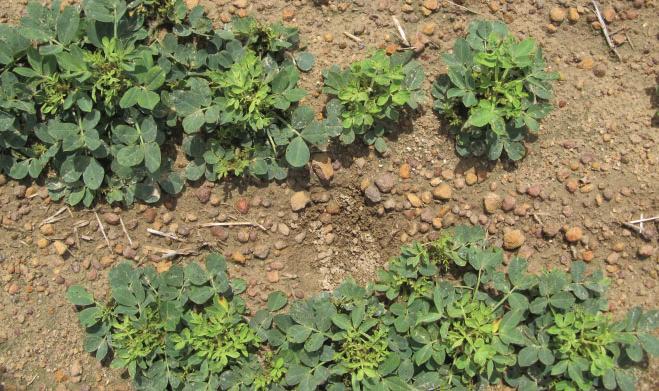
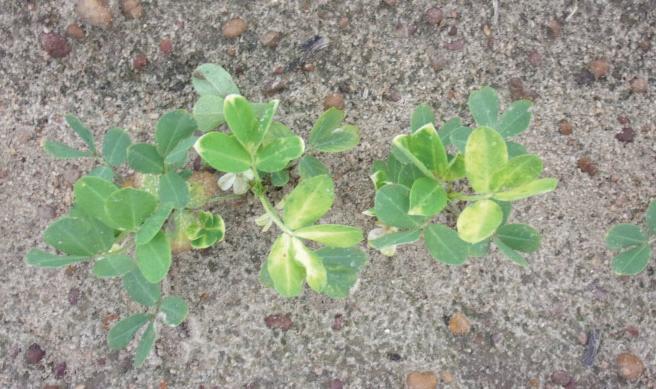

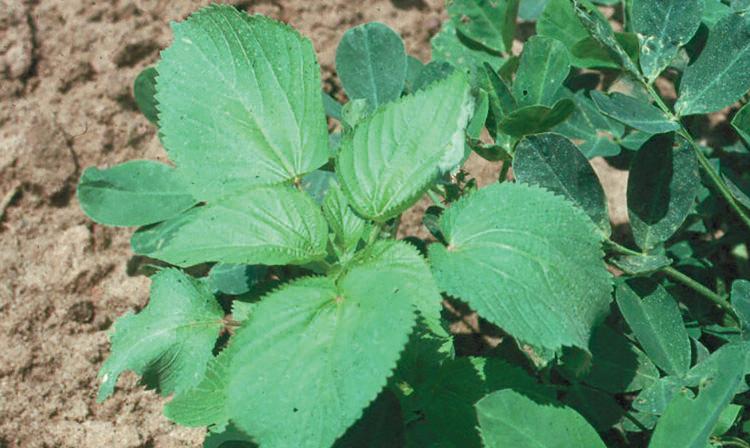
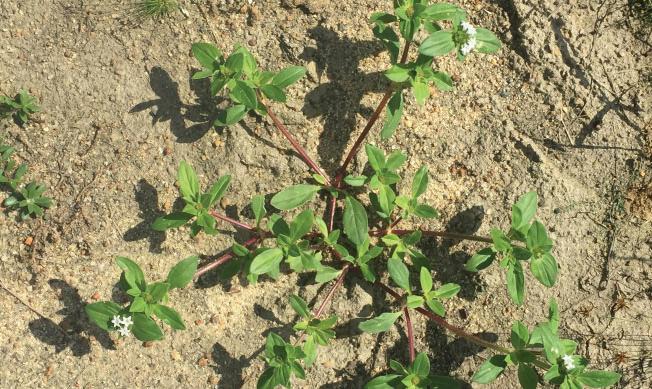



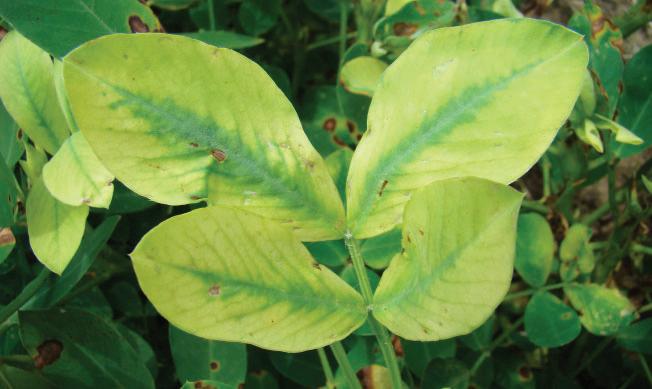
Southeastern Peanut Farmer | March 2024 14 WEED GUIDEBOOK
1.
2.
3.
4.
5.
6.
7.
8.
9.

Six Wiregrass Schools taking part in unique peanut research this spring
Students in six schools in the Wiregrass area are participating in a one-of-its-kind genomics research project through a partnership with HudsonAlpha Wiregrass this spring.
Students at Dothan High School, Carver 9th Grade Academy (Dothan City Schools), Rehobeth High School, Cottonwood High School (Houston County Schools), Slocomb High School (Geneva County Schools) and Headland High School (Henry County Schools), are working on the WIREGRASS (With Innovative Regional Experience Growing Real Advancements through Student Scientists) Peanut Project under the direction of HudsonAlpha faculty investigator Josh Clevenger and the Institute's educational outreach team, including vice president of educational outreach Kelly East.
"Peanuts are an important part of our economy and heritage, and this WIREGRASS Peanut project is a special opportunity for local students," says Dean Mitchell, director of HudsonAlpha Wiregrass. "We want the students to gain real-life research experience while also using the power of genomics to develop more drought and disease-resistant peanut varieties."
Students planted peanut seeds in January and will extract DNA from growing plants in late February. That DNA will be transported to the HudsonAlpha Institute for Biotechnology in Huntsville for the DNA to be sequenced in March. In April, students will receive and analyze the DNA data for each plant, and make informed breeding decisions with Clevenger, who will facilitate the crossing of the selected plants.
The HudsonAlpha team provides training, resources, and hands-on support to the Wiregrass teachers implementing this innovative project in their classrooms.

The City of Dothan and HudsonAlpha partnered in 2022 to expand HudsonAlpha's footprint into Dothan, creating the HudsonAlpha Wiregrass that focuses on agricultural
research, economic development and genomics education.
To learn more about the project, visit hudsonalpha.org/wiregrass.
HudsonAlpha CRops Conference set for June
HudsonAlpha Institute is excited to host its 5th CROPS Conference on June 3 - 6, 2024. Hundreds of scientists, agricultural researchers, professionals and students are expected to join the Institute this summer for the conference. The Institute is partnering with the University of Georgia's College of Agriculture and Environmental Sciences and Bayer for the week-long event.
"I am excited HudsonAlpha is hosting the CROPS Conference again in 2024," says Jeremy Schmutz, HudsonAlpha researcher and CROPS Conference organizer. "Collaboration is key when it comes to science, so it will be great to get together and share the diversity of research that is happening in agriculture."
The four-day, in-person conference will include talks from experts looking to address the intersection of emerging genomic technologies and their application to crop improvement. The conference will focus on methods to improve plant sustainability of current and future agriculture.
Agriculture is one of the largest industries in Alabama, with more than 40,000 farms across the state. The National Agricultural Statistics Services estimates the economic impact of agriculture across the state to be about $5.5 billion.
Students and professionals can take advantage of early bird pricing for the conference until March 18. Registration information is available online at hudsonalpha.org.
Southeastern Peanut Farmer | March 2024 16
Josh Clevenger, faculty investigator at HudsonAlpha, teaches students at Rehobeth High School in Alabama more about research and genomics through a partnership with HudsonAlpha’s WIREGRASS Peanut project.
Georgia Peanut Commission holds referendum March 8 – April 8
The Georgia Peanut Commission will hold a referendum March 8 through April 8 giving peanut producers an opportunity to vote on reaffirming the commission. State law mandates a referendum be held every three years. Georgia peanut producers invest $2 per ton to fund the commission and its research, education, promotion and communication programs.
The last referendum in 2021 passed with a 94.43 percent reaffirmation.
"I urge all peanut producers to vote in this referendum. Research, education and promotion continue to be the core focus of the commission,"
Asays Joe Boddiford, GPC chairman. "It is extremely important for growers to continue to focus their efforts on supporting research and promotional efforts through their checkoff dollars. One way for farmers to do that is by continuing their support of the Georgia Peanut Commission."
GPC Executive Director Don Koehler urges producers to contact him by email at don@gapeanuts. com or 229-386-3470 if they have any questions about the commission’s activities or the referendum.
Peanut producers who do not receive a ballot may obtain one by calling the commission. The commission requests that anyone

who receives a ballot but is no longer farming to write, "no longer producing" on the certification envelope and return it to the commission. This will assist the commission in updating its mailing list. The commission's address is P.O. Box 967, Tifton, Georgia 31793.
The Certified Public Accounting Firm of Allen, Pritchett, and Bassett will count the votes.
Peanut Efficiency Awards seeking nominees
chieving high yields and grades are only part of the equation for efficient, longterm sustainable peanut production.
The Farm Press Peanut Efficiency Award is based on production efficiency, honoring growers who produce the highest yields by using inputs wisely. The awards are presented based on the producer’s entire peanut operation and not on individual farms or small plots.
A second major component of the Peanut Efficiency Award is education. Southeast Farm Press, Delta Farm Press and Southwest Farm Press support the education element by publishing articles throughout the year focusing on peanut production efficiency.
Awards are presented to growers from the Lower Southeast, including Alabama, Georgia, Florida; the Upper Southeast, including Virginia, North Carolina and South Carolina; the Southwest, including Texas, Oklahoma and New Mexico; and the Delta, including Mississippi, Arkansas and Missouri.
"The elements of production cost and price are equally important factors in our evaluation of nominees.

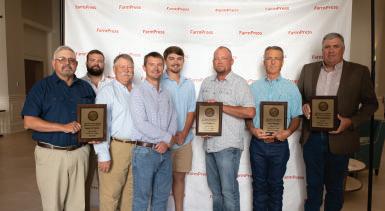
Marketing expertise definitely has given an edge to recent winners of the award," says Marshall Lamb, research director for the National Peanut Research Laboratory and primary advisor of the PEA program.
Please submit nomination forms directly to the National Peanut Research Laboratory, or local county Extension agent, peanut specialist or economist. The deadline for all nominations is April 15, 2024. Growers can access the nomination form online at www.farmprogress. com/peanuts. To receive a hard copy of the form, call Farm Press headquarters at 662-624-8503.
The awards program has honored 24 classes of winners from the U.S. peanut belt. Since the program's beginning in 2000, the Peanut Efficiency Awards have honored over 70 deserving growers and farms. The awards program began with the Southern Peanut Growers Conference in conjunction with the Southern Peanut Farmers Federation and the two have grown together over the years.
Winners of the 2024 awards will receive an expense-paid trip for two to the Southern Peanut Growers Conference, July 17-19, at the Westin Savannah Harbor Golf Resort & Spa in Savannah, Georgia.
March 2024 | Southeastern Peanut Farmer 17
The 2023 Farm Press Peanut Efficiency Award winners were (left to right) Delta: Bill, Clay, Mark, Matt and Hunter Deane of Triple D Farms, Sikeston, Missouri; Southwest: John Reddecop, Seminole, Texas; Upper Southeast: Colt Woody, Aiken, S.C., and Lower Southeast: Ryan Jenkins, Jay, Fla. Not pictured is Upper Southeast winner, Brandon Woody.
2024 Georgia Peanut Farm Show Provides a Day of Education
By Joy Crosby
Pore than 1,000 attendees were able to fine-tune their farming operations with information gained at the 47th annual Georgia Peanut Farm Show and Conference Jan. 18, 2024, at the University of Georgia Tifton Campus Conference Center in Tifton, Georgia. The show is sponsored by the Georgia Peanut Commission.
The one-day show offered farmers a chance to view the products and services of 100 exhibitors and education opportunities. The University of Georgia Peanut Team presented an educational peanut production seminar focusing on the yield and quality of 2023 peanuts and what to expect in 2024, weed, disease and nematode management for 2024 and sustainability in Georgia peanut production. An industry seed seminar was held, which highlighted peanut varieties available for 2024.
The Georgia Peanut Commission presented awards to individuals and businesses for their service to the peanut industry and promotion of peanuts across the United States. The award recipients include Distinguished Service Award – John T. Powell, executive director of the American Peanut Shellers Association and The Peanut Instititute; Research and Education Award – Glen Harris, University of Georgia Extension soil fertility specialist; and the Media Award – Dal Cannady, former bureau chief for WTOC-TV in Savannah.
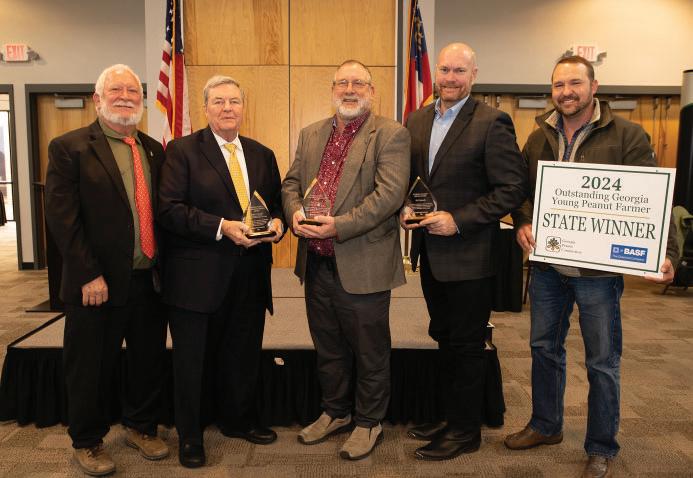
The Outstanding Georgia Young Peanut Farmer Award, sponsored by the Georgia Peanut Commission and BASF, was presented to Mallory Harvey, Baxley, Georgia. The award is presented to one Georgia peanut farmer based upon the applicant’s overall farm operation; environmental and stewardship practices; and leadership and community service activities. Havey grows 1,500 acres of peanuts and cotton, as well as breeder hens with Pilgrim’s Pride.
Harvey strives to utilize innovative stewardship practices on the farm to reduce his carbon footprint and water usage. He is also active within a number of community and agriculture organizations within his county.
In addition to the Outstanding Georgia Young Peanut Farmer Award, the Georgia Peanut Commission and Agri Supply presented the Outstanding Georgia Peanut Farmers of the Year Award to individuals representing each of the commission’s five districts. The GPC board members started this award to honor farmers who have the passion, diligence, leadership and desire to see the peanut industry in the state of Georgia continue to be the highest quality. Winners include District 1 – Donald
Southeastern Peanut Farmer | March 2024 18
Pictured from left, Georgia Peanut Commission Chairman Joe Boddiford congratulates the 2024 award recipients who are: Distinguished Service Award – John T. Powell, executive director of the American Peanut Shellers Association & The Peanut Institute; Research & Education Award –Glen Harris, University of Georgia Extension soil fertility specialist; Media Award – Dal Cannady, former bureau chief for WTOC-TV in Savannah; and Outstanding Georgia Young Peanut Farmer Award - Mallory Harvey of Appling County.
Presentations from the UGA Peanut Team Seminar and Seed Seminar are available online at www.GaPeanuts.com.

Shirah, Camilla; District 2 – Gerald Fowler, Sycamore; District 3 – Lee Cromley, Brooklet; District 4 – Sam Crenshaw, Cordele; and District 5 posthumously – Richard Morrison, Lumpkin. These farmers received a sign to display at their farm and gift cards from Agri Supply and the Georgia Peanut Commission.
At the close of the day, the presentation of the Grand Door Prize donated by Kelley Manufacturing Co. was presented to Jim Deen, Broxton, Georgia. Deen received one season’s use of a new KMC peanut combine and the option of purchasing the combine from a KMC dealer with $15,000 off the list price at the end of the 2024 season, as well as a cash prize.
Amadas Industries also provided the Grower Door Prize to Zach Brown of Sumner, Georgia, and Ted O’Steen, Ambrose, Georgia. Brown received a customized Grizzly cooler and a certificate towards the purchase of a new Amadas self-propelled peanut combine, pull-type peanut combine, peanut digger or peanut dump cart. O’Steen received a customized Grizzly cooler and a certificate for Amadas parts.
For photos and additional information on the Georgia Peanut Farm Show and Conference, visit the Georgia Peanut Commission website at www.gapeanuts.com.
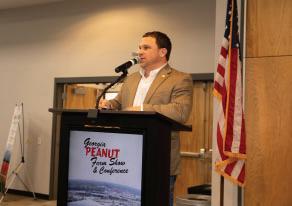



March 2024 | Southeastern Peanut Farmer 19
The Georgia Peanut Commission presents the 2024 Outstanding Georgia Peanut Farmers of the Year award during the Georgia Peanut Farm Show, Jan. 18, 2024. Pictured left to right: Joe Boddiford, GPC chairman; District 1 - Donald Shirah, Camilla; District 2 - Gerald Fowler, Sycamore; District 3 - Lee Cromley, Brooklet; District 4 - Sam Crenshaw, Cordele; and District 5 - Winston Morrison accepting on behalf of his father, the late Richard Morrison, Lumpkin; and Angela Carter with AgriSupply.
Roy Moore (left) and Danny Bennett (right) of Kelley Manufacturing Co. present the Grand Door Prize to Jim Deen, Broxton, Ga., during the Georgia Peanut Farm Show. Deen received one season’s use of a new KMC peanut combine and the option of purchasing the combine from a KMC dealer with a $15,000 off the list price at the end of the 2024 season, as well as a cash prize.
Chris Beaty (left) and Keith Weeks (right) of Amadas Industries present the Grower Door Prize to Zach Brown, Sumner, Ga., during the Georgia Peanut Farm Show. Brown received a customized Grizzly cooler and a certificate towards the purchase of a new Amadas selfpropelled peanut combine, pull-type peanut combine, peanut digger or peanut dump cart.
Chris Beaty (left) and Keith Weeks (right) of Amadas Industries present the Grower Door Prize to Ted O’Steen, Ambrose, Ga., during the Georgia Peanut Farm Show. O’Steen received a customized Grizzly cooler and a certificate for Amadas parts.
Georgia Ag Commissioner Tyler Harper commended the Georgia Peanut Commission and other ag organizations for working last year to get additional peanut research positions funded for the UGA College of Agricultural & Environmental Sciences during the Georgia Peanut Farm Show luncheon.
Peanut Leadership Academy Class XIII meets in savannah
By Jessie Bland
Twenty-seven peanut growers and sheller representatives from across the Southeast, Arkansas, Texas and the Virginia-Carolina area began Class XIII of the Peanut Leadership Academy Jan. 8-11, 2024, in Savannah, Georgia. The Peanut Leadership Academy is hosted by the Southern Peanut Farmers Federation and is a cooperative effort between Syngenta Crop Protection, the American Peanut Shellers Association and grower organizations. The program began in 1998 with the first class of 14 peanut growers from Alabama, Florida and Georgia. Since then, the academy has grown to include farmers from Arkansas, Mississippi, North Carolina, South Carolina, Texas, Virginia and sheller representatives.
Activities in the leadership program are structured to give participants a thorough understanding of the U.S. peanut industry. Throughout the course of 18 months and five sessions, program attendees participate in sessions ranging from field trips, meetings with industry leaders and professional development training, as well as one session in Washington, D.C., where class members have an opportunity to visit with members of Congress about issues affecting the peanut industry. During this time, class members build on leadership skills, discuss and debate key industry issues and build relationships.
During the first session, the class members participated in leadership team building skills, etiquette training and learned more about the entire peanut industry while joining the Southern Peanut Farmers Federation annual meeting.
Session two of Class XIII is scheduled for March 17-20, 2024.
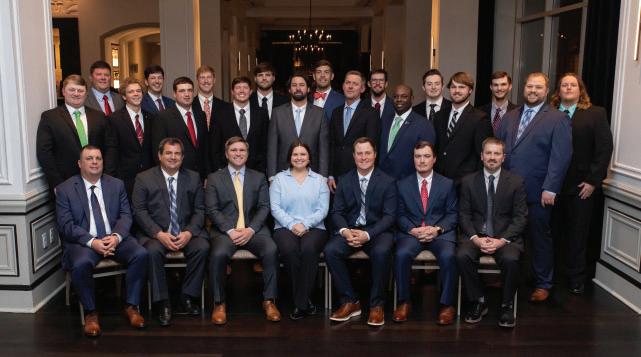
CLASS XIII PARTICIPANTS
Alabama
August Cassebaum, Lillian
Jay Corte, Daphne
Garrett Dixon, Salem
Travis Mixon, Dothan
Garrett Moore, Chancellor
Arkansas
Heath Donner, Manila
Florida
Lonnie Gilbert, Marianna
Phillip Melvin, Altha
Cody Robinson, Williston
Georgia
Sean Brannen, Statesboro
Riley Davis, Parrott
Judson Hornsby, Iron City
Will Krause, Unadilla
Daniel McMillan, Enigma
Jess McNeill, Americus
Emily Williams, Atlanta
North Carolina
Cutchin Anderson, Tarboro
South Carolina
Douglas Jarrell, Estill
Texas
Henry Froese, Seagraves
Kirk Martin, Brownfield
Virginia
Eric Bailey, Waverly
Sheller Representatives
Emmanuel Bankston, Golden Peanut
Miles Birdsong, Birdsong Peanuts
Trevor Dyer, Sandy Land Peanut
Chad Harris, Olam
Chase Trimble, Coastal Growers
Cason Kirkland, Premium Peanut
Peanut Leadership Academy
www.southernpeanutfarmers.org
Southeastern Peanut Farmer | March 2024 20
The Peanut Leadership Academy Class XIII participants gathered for their first leadership session in Savannah, Georgia. Sitting (left to right): Phillip Melvin, Judson Hornsby, Daniel McMillan, Emily Williams, Cody Robinson, Cason Kirkland and Heath Donner. Standing (left to right): Jay Corte, Chad Harris, Chase Trimble, Garrett Dixon, August Cassebaum, Riley Davis, Garrett Moore, Will Krause, Douglas Jarrell, Jess McNeill, Henry Froese, Sean Brannen, Emmanuel Bankston, Miles Birdsong, Travis Mixon, Kirk Martin, Trevor Dyer and Eric Bailey. Not pictured: Cutchin Anderson and Lonnie Gilbert.
USDA Announces Voting Period for Continuance Referendum for National Peanut Research and Promotion Program
Eligible peanut producers can opt to vote electronically or by paper ballot.
The U.S. Department of Agriculture (USDA) has published a notice in the Federal Register announcing a referendum among eligible producers of peanuts to determine whether they favor continuance of the Peanut Promotion, Research and Information Order (Order), which authorizes the National Peanut Board.
The referendum will be conducted from April 8 through April 19, 2024. USDA will provide the option for electronic balloting. Further details will be stated in the official ballot instructions, which will be sent by regular U. S. mail to all eligible peanut producers. Voters must return ballots postmarked by April 19, 2024. Ballots returned via express mail or electronic means must show proof of delivery by no later than 11:59 p.m. Eastern Time (ET) on April 19, 2024.
To be eligible to vote in this continuance referendum, persons must have produced peanuts and been subject to assessments during the representative period from January 1, 2022, through December 31, 2022.
Under the Commodity Promotion, Research and Information Act of 1996 (Act), the U.S. Department of Agriculture must conduct a referendum every five years or when 10% or more of the eligible peanut producers petition the Secretary of Agriculture to hold a referendum to determine if persons subject to assessment favor continuance of the Order. The Department of Agriculture would continue the Order if continuance is approved by a simple majority of the producers voting in the referendum.
Vickie Carpenter and Deanna

Bakken, MDD, SCP, AMS, USDA, Stop 0244, Room 1406-S, 1400 Independence Ave., S.W., Washington, D.C. 20250-0244, are designated as the referendum agents to conduct this referendum. The referendum agents will distribute the ballots and voting instructions by U.S. mail or through electronic means to all known producers prior to the first day of the voting period. Persons who produced peanuts and were subject to assessments during the representative period are eligible to vote.
Any eligible producer who does not receive a ballot should contact the referendum agent as soon as possible.
enrollment open through April for the Sustainable U.S. Peanuts
The American Peanut Council is currently taking grower enrollments for the Sustainable U.S. Peanuts Initiative's (SUSP) 2023 crop. In its third year, SUSP is an industry-supported data-collection platform for growers to voluntarily input information on their individual farming practices, such as crop rotation, cover crops, water usage, and breeding and nesting habitats, just to name a few.
Never before has collecting information on growers' sustainability practices been so important. Not only are consumers demanding sustainable food production practices, but manufacturers, retailers and even our international trading partners are increasingly having the same expectations. SUSP is supporting America’s peanut farmers with metrics
on the most efficient use of on-farm resources, as well as encouraging farm operation sustainability practices that will help meet these expectations, lead to increased demand for peanuts and set the stage for long-term economic viability.
Growers can enroll in SUSP by completing an annual self-assessment (20-40 minutes) and field-level survey (20-30 minutes). Subsequent years’ enrollments are much faster after a grower’s initial enrollment. If a grower is already enrolled in the Cotton Trust Protocol, they can join that account with SUSP to streamline their enrollment. Growers can enroll now through the end of April at sustainableuspeanuts.org, or by contacting Allie Randell via email at arandell@peanutsusa.com.


March 2024 | Southeastern Peanut Farmer 21
Enroll by end of April 2024. www.sustainableuspeanuts.org
2024 Alabama-Florida Peanut Trade show a success
by Kaye Lynn Hataway
Peanut growers from Alabama and Florida were able to fine-tune their farming operations with information gained at the AlabamaFlorida Peanut Trade Show Feb. 1, 2024, at the National Peanut Festival fairgrounds in Dothan, Alabama. The trade show was hosted by Alabama Peanut Producers Association and Florida Peanut Producers Association, and sponsored by National Peanut Board. The National Peanut Festival was the venue sponsor.
More than 400 peanut growers and industry partners from Alabama and Florida attended to view industry products and services offered by more than 60 exhibitors.
Researchers from Auburn University and the University of Florida were on hand to showcase the peanut research they are working on with the support of grower check-off dollars. Growers could talk to the researchers
Tone-on-one about the research projects.
During the lunch program, attendees heard from Greg Baltz, chairman of the National Peanut Board and an Arkansas peanut farmer and Ryan Lepicier, president and CEO of the National Peanut Board. Bob Redding of the Redding Firm delivered a legislative update via video. U.S. Sen. Tommy Tuberville shared greetings to the growers via video as well. Marshall Lamb, from the National Peanut Research Lab, provided an overview to growers regarding the 2024 peanut market.
Several door prizes were given out throughout the morning of the trade show, but the prizes everyone was most looking forward to winning were announced after lunch.
Dennis McCord of Cottonwood, Alabama, won the Grand Door Prize,
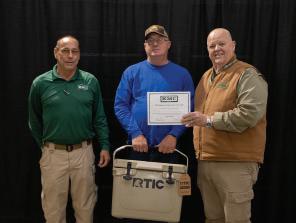
provided by Kelley Manufacturing Co. The prize included a certificate for $5,000 off the price of KMC equipment or parts.
Myron Johnson of Headland, Alabama, won a free trip to the 2024 Southern Peanut Growers Conference in July and Ashley Kelley of Andalusia, Alabama, won a Stoeger 12 gauge shotgun.
Mississippi holds 2024 annual meeting
he Mississippi Peanut Growers Association held its 19th annual meeting Feb. 15, 2024, at the Forrest County Multipurpose Center in Hattiesburg, Mississippi. During the meeting, Mississippi peanut growers had the opportunity to hear from peanut industry representatives and specialists, as well as visit with agricultural companies during the trade show.
During the annual meeting, Mississippi peanut growers received information on southern stem rot from Dan Anco, Extension peanut specialist at Clemson University, and cotton production updates from Brian Pieralisi, MSU Extenstion cotton specialist. Marshall Lamb, research director at the National Peanut Research Lab, provided an update on USDA ARS research and an economic update for 2024, while Mississippi State University’s peanut agronomist, Brendan Zurweller, provided an
update on peanut variety research projects in Mississippi.
Mississippi peanut growers also received promotional updates from DeMarquine Houston of the National Peanut Board. Lonnie Fortner, chairman of the Mississippi Peanut Promotion Board, and Malcolm Broome, MPGA executive director presented an overview of some of the promotional activities throughout the past year.
During the annual meeting, MPGA members elected members to the board of directors. The officers elected include Joe Morgan, president from District 1 and Lonnie Fortner, vice president from District 2. Additional board members elected include Alan Atkins for District 3, Van Hensarling for the At-Large Position A and Pallas Fair for the At-Large Position C.
At the close of the annual meeting the Grand Door Prize was presented
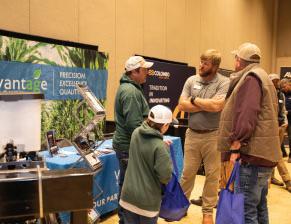
to Steve Sanford, Collins, Mississippi. He received a $5,000 voucher for a discount on KMC equipment or for parts. The Grower Door Prize was presented by Amadas Industries to Joe Morgan Jr., Hattiesburg, Mississippi. Morgan received a certificate for the purchase of new Amadas peanut equipment.
For more information visit MPGA's website at misspeanuts.com.
Southeastern Peanut Farmer | March 2024 22
Danny Bennett (left) and Glen Gulledge (right) present the Grand Door Prize from Kelley Manufacturing Co. to Dennis McCord, Cottonwood, Ala., during the Alabama-Florida Peanut Trade Show, Feb. 1, 2024, in Dothan, Ala.
Farmers visit with the exhibitors during the 2024 Mississippi Peanut Growers Association annual meeting, Feb. 15, 2024, in Hattiesburg, Miss.
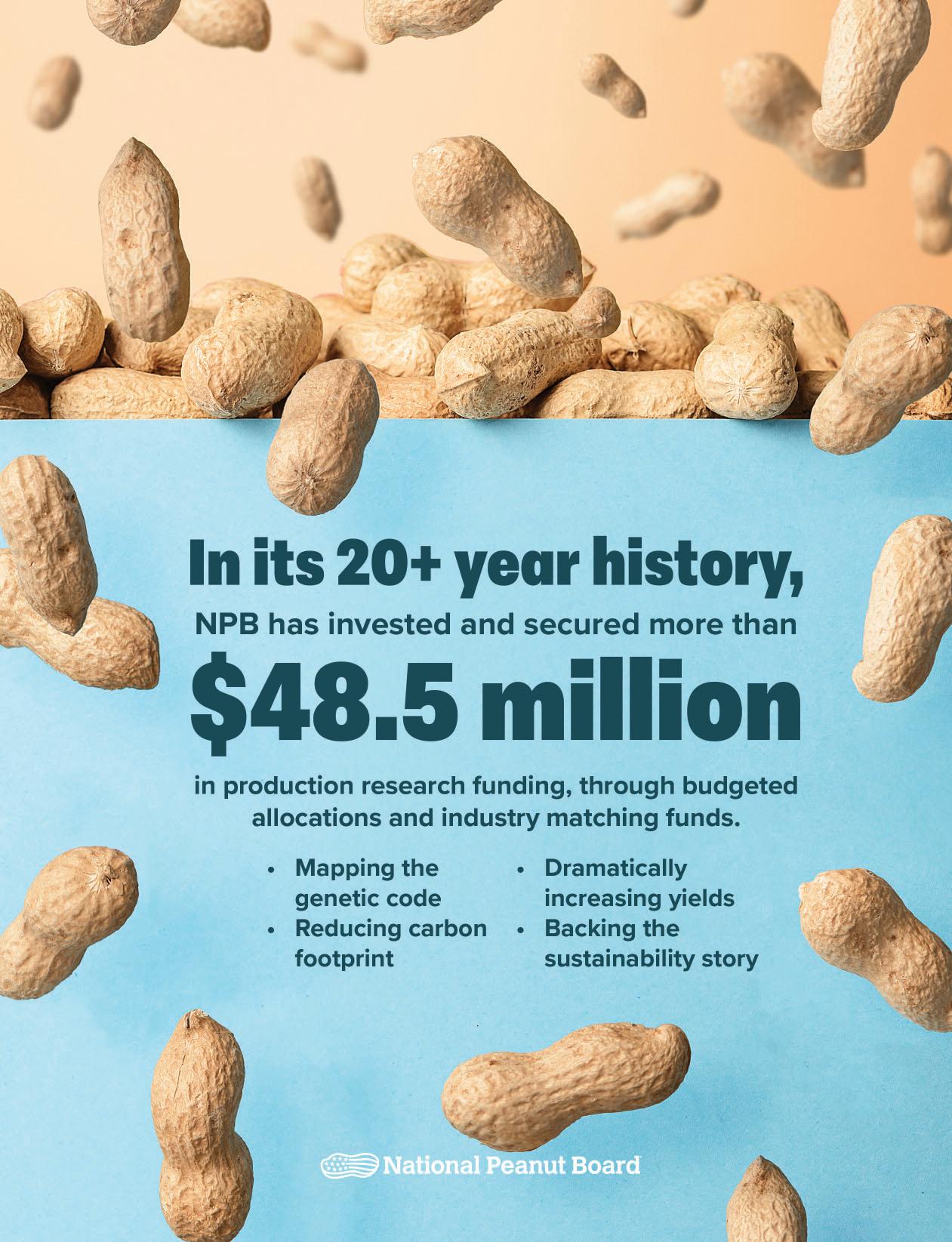
Washington Outlook
By Robert L. Redding Jr.
USDA Secretary Vilsack testifies in front of U.S. House Agriculture Committee
U.S. Department of Agriculture Secretary Tom Vilsack testified in front of the U.S. House Agriculture Committee on Feb. 14, 2024. Secretary Vilsack answered questions from U.S. House Agriculture Committee members on topics including the Farm Bill, disaster relief programs, conservation, and nutrition.
U.S. Rep. Austin Scott, R-Georgia, questioned Secretary Vilsack about the budget makeup of the upcoming Farm Bill and the increasing share of Supplemental Nutrition Assistance Program (SNAP) funding compared to funding for production agriculture. Below is an excerpt from Congressman Scott's questions to Secretary Vilsack:
Scott: "Well my question for you is what percentage of what you receive at the USDA should actually go to production agriculture? My point is you talking about the loss of the family farm, well starving farmers don't get to plant the food to feed hungry people."
Vilsack: "Well the reality is, it's not about planting food - we are doing a great job at that. American farmers are the best in the world at that. We have seen a remarkable increase
in productivity with inputs basically maintaining and actually there is a…"
Scott: "Let me read something to you—well it's my time, so let me read to you from a good farmer. This isn't someone that inherited, this is someone who built their own family farm. 'This year reminds me a lot of the early 1980's. I had a lot more optimism in my 20's than in 60's. Making plans on which piece of land to sell off and get stable for the bumpy ride for agriculture.'"
Scott: "Secretary Vilsack, have you talked to any farmers about how much fertilizer costs, how much diesel costs, about the cost of land rent, because of what you've done with solar subsidies and everything else?"
U.S. Rep. Frank Lucas, R-Oklahoma, raised questions with Secretary Vilsack regarding the implementation of the 2022 Emergency Relief Program (ERP) for disaster assistance.
Congressman Lucas stated: "It's always been clear to me that the strongest policies that come out of this committee, and most important programs administered by USDA are built on the belief that support and relief programs must be tied to crop

production. When this committee or your agency stray from that principle, we begin to walk down an unsustainable and a very concerning path.
When you last appeared before this committee I raised concerns about your agency's design and implementation of phase two of the Emergency Relief Program for 2021 crop year, and called for a return to the ERP phase one methodology. You said that your agency would learn from their experiences during the first iteration of ERP.
Well, based on the reports that I'm hearing from my producers in Oklahoma, ERP 2022, has proven to be no better than its predecessor at delivering support to those who suffered the greatest crop losses."
In response, Secretary Vilsack cited the lack of appropriations from the U.S. Congress for disaster relief. According to Secretary Vilsack, USDA estimated the damages to be $10 to $12 billion and the U.S. Congress appropriated $3 billion for the program.
Secretary Vilsack is set to appear in front of the U.S. Senate Agriculture Committee later this month.
U.S. House Agriculture Committee Minority send letter on Farm Bill priorities
U.S. House Agriculture Committee
Ranking Member David Scott sent a memorandum outlining "Democratic Principles for the Next Farm Bill." The memo stated:
"This is our responsibility. This is our work. We are committed to getting it done. We have gone through this process in good faith and with goodwill, ever striving to pass a strong, effective, bipartisan farm bill. After watching Republican infighting
delay work in the House on any legislation, we were able to extend the 2018 Farm Bill to give the House the time necessary to finish this important work. To that end, we want to make clear the principles and standards against which the final farm bill will be measured to earn Democratic support."
The memo outlined the following priorities for a Democratic Farm Bill:
• Reduce Hunger
• Strengthen America’s Farmers
• Invest in Sustainable Agriculture
• Revitalize Rural America
• Lower Costs for Farmers and Families
• Improve Equity
• Support Renewable and Bioenergy
Southeastern Peanut Farmer | March 2024 24
Senator Tommy Tuberville leads letter on H-2A
U.S. Sen. Tommy Tuberville, R-Alabama, led nine Republican colleagues in sending a letter to the leadership of the U.S. House and Senate Appropriations Committees slamming the increase in Adverse Effect Wage Rates (AEWR). Sen. Tuberville and his colleagues are requesting language in an upcoming appropriations package to freeze H-2A wage rates at the January 2023 levels and reinstate the 14-day delay between the AEWR rate posting and the implementation period. The AEWR increase furthers the financial burdens upon employers who utilize the H-2A program.
"The recent 2024 AEWR increase imposes significant financial strains upon employers who utilize agricultural guestworkers, yet many employers do not have another option as they depend upon the H-2A program for a reliable workforce," said the Senators."As the demand for H-2A labor remains strong, employers who utilize the program generally agree that without additional labor from guestworkers, American producers could not efficiently plant or harvest crops."
The U.S. Peanut Federation supported this letter alongside the American Farm Bureau Federation and other agriculture groups.
USDA projects farm sector profits to fall in 2024
The U.S. Department of Agriculture Economic Research Service recently released the February 2024 Farm Income Forecast. According to the report, net farm income, a broad measure of profits, is forecast at $116.1 billion in calendar year 2024, a decrease of $39.8 billion (25.5 percent) relative to 2023 in nominal (not adjusted for inflation) dollars. With this expected decline, net farm income in 2024 would be 1.7 percent below its 20-year average (2003–22) of $118.2 billion and 40.9 percent below the record high in 2022 in inflation-adjusted dollars.
U.S. Department of Health and Human Services hosts Food is Medicine Summit
The U.S. Department of Health and Human Services hosted the first ever Food is Medicine summit in Washington, D.C. At the summit, HHS released five Food is Medicine principles that will guide the department's work when it comes to educating the public, changing public policies and integrating nutrition in the services it provides.
These principles include:
• Recognizing that nourishment is essential for good health, wellbeing, and resilience.
• Facilitating easy access to healthy food across the health continuum in the community.
• Cultivating understanding of the relationship between nutrition and health.
• Uniting partners with diverse assets to build sustained and integrated solutions.
• Investing in the capacity of under-resourced communities.
U.S. Congress continues work to fund government
In January, the U.S. Congress passed a second "laddered" continuing resolution that funded the government by setting up two deadlines. The first March 1 deadline covers agencies under four appropriations bills: Agriculture-FDA, Energy and Water, Military Construction-VA and Transportation-HUD. The other eight appropriations bills are extended to a March 8 deadline.
In addition to extending funding and setting up deadlines for appropriations, the original continuing resolution from late 2023 included a 1-year extension of Farm Bill programs at the same levels authorized in the 2018 Farm Bill. The legislation also includes funding for a number of "orphan programs" which are small-ticket programs that had expired funding at the end of Fiscal Year 2023.

March 2024 | Southeastern Peanut Farmer 25

1025 Sugar Pike Way · Canton, Georgia 30115 |(770) 751-6615 | lpwagner@comcast.net
Georgia Family and Consumer Sciences Agent Training
As part of the Southern Peanut Growers Pilot Program with the University of Georgia on early introduction to prevent peanut allergy, Dr. Ali Berg, University of Georgia associate professor and Extension nutrition and health specialist, led a training session for 30 Family and Consumer Sciences (FACS) extension agents and specialists across the state of Georgia. The training was part of the annual training for extension agents at the Rock Eagle 4-H Center on Jan. 18, 2024.
The agents were given on overview of the new training modules for daycare providers and school nutrition and the materials available for health fairs, WIC counselors, and community health department events.
Georgia Peanuts at C.J. Hicks Elementary School
Joe Boddiford, chairman of Georgia Peanut Commission, and Leslie Wagner, executive director of Southern Peanut Growers, taught C.J. Hicks Elementary School's first grade classes all about Georgia Peanuts. Sarah Davie, the agriculture and sustainable teacher for the elementary school in Conyers, attended the Georgia Peanut Tour on a grant from the Georgia Peanut Commission in 2022.
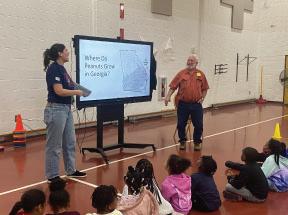
Agents also were able to sample the Bamba Peanut Puffs which are now readily available at Publix and Target stores in Georgia.
The agents divided into groups where they moved through hands-on presentations on "Plan, Don't Ban" for school nutrition; three different ways to use peanut powder and peanut butter in the earliest introduction at 4 - 6 months; and two different recipes to make at home for kids to self-feed at 6+ months. Leslie Wagner led the earliest introduction breakout session.
FACS Agents have also received materials for local events and the Carroll County FACS Extension agent has requested SPG to attend an event in Carrollton for 200 people in April.

Almost Empty Jar Peanut Butter Sauce
Peanut butter jars are notoriously hard to clean out. But rather than waste those last golden scoops, you can make this tasty sauce right in the jar! Use it on rice, noodles, or make an Insta-worthy Buddha Bowl with all your meat and veggie left-overs.
Ingredients
1 almost empty jar of peanut butter
2 Tablespoons low sodium soy sauce
1 Tablespoon rice wine vinegar
1 Tablespoon honey
½ teaspoon sriracha sauce
1 clove garlic, minced
Dash ground ginger
Directions

Pour all ingredients into your almost empty peanut butter jar and shake well. You may have to open the jar and use a long spoon to scrape the peanut butter from the sides/bottom and shake again until sauce is pourable.
Serve over a power bowl of your choice (grain like brown rice or quinoa, veggies, and protein of choice); noodle bowl with your choice of veggies and protein; or a salad. This is a great way to use up left-over ingredients in your refrigerator as well as the last little bit (maybe a couple tablespoons) of peanut butter!
Southeastern Peanut Farmer | March 2024 26
Leslie Wagner, Southern Peanut Growers executive director, presents information on early introduction of peanuts to Georgia Family and Consumer Science agents during a training.



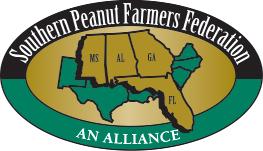

Southeastern Peanut Farmer | March 2024 28 Southern Peanut Growers Conference WESTIN SAVANNAH HARBOR GOLF RESORT & SPA July 17-19, 2024 - Savannah, Georgia Key topics: Legislation, Research and Promotion For more information contact: Alabama Peanut Producers Association P.O. Box 8805 Dothan, AL 36304 334-792-6482 Florida Peanut Producers Association 2741 Penn Avenue, Suite 1 Marianna, FL 32448 850-526-2590 Georgia Peanut Commission P.O. Box 967 Tifton, GA 31793 229-386-3470 Mississippi Peanut Growers Association P.O. Box 284 Petal, MS 39465 601-606-3547 Registration opens April 1, 2024. www.southernpeanutfarmers.org 25thAnnual Event!


































































